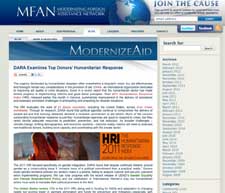March 12, 2012
Source: Modernizing Foreign Assistance Network
The urgency demanded by humanitarian disasters often overwhelms a long-term vision, but aid effectiveness and foresight remain key considerations in the provision of aid. DARA, an international organization dedicated to improving aid quality in crisis situations, found in a recent report that the humanitarian sector has made limited progress in implementing reforms and good donor principles. Their 2011 Humanitarian Response Index (HRI), released earlier this month in Geneva, summarizes improvement in the delivery of assistance and assesses persistent challenges in anticipating and preparing for disaster situations.
The HRI evaluates the work of 23 donor countries, including the United States, across nine crises worldwide. Through its research, DARA found that political agendas continue to compromise the delivery of neutral aid and that looming obstacles demand a renewed commitment to aid reform. Much of the concern surrounding humanitarian response is just that: humanitarian agencies are quick to respond to crises, but they rarely devote adequate resources to prediction, prevention, and risk reduction. As broader challenges – climate change, shifting demographics, and economic austerity – become reality, nations will need to embrace non-traditional donors, building local capacity and coordinating with the private sector.
The 2011 HRI focused specifically on gender integration. DARA found that despite continued rhetoric around gender as a cross-cutting issue it “remains more of a political commitment than a practical reality.” Donors enact gender-sensitive policies but seldom make it a priority, failing to analyze cultural and security concerns when implementing programs. We can note progress with the recent release of USAID’s Gender Equality and Female Empowerment Policy and the celebration of International Women’s Day, but humanitarian actors must work to translate their political promises to the field.
The United States ranked 17th in the 2011 HRI, doing well in funding for NGOs and adaptation to changing needs but scoring lower in earmark elimination and funds for prevention and mitigation—especially with regards to climate change. The U.S. is classified as a “Learning Leader”—a donor with a strong field presence and a commitment to evaluation and improvement. Though responses were mixed, field partners reported that the U.S. “is among the most proactive donors in working with partners to implement evaluation recommendations” and that USAID’s OFDA generally integrates gender into its approaches.
DARA calls for increased transparency and accountability from donor governments. Moving forward, actors must improve monitoring and embrace an aid reform agenda that considers prevention and risk reduction for future crises. DARA extends its recommendations to all actors – not just traditional donors – to respond fully to the needs of vulnerable populations.

Share this